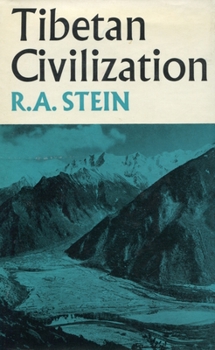Tibetan Civilization
Select Format
Select Condition 
Book Overview
A Stanford University Press classic.
Format:Paperback
Language:English
ISBN:0804709017
ISBN13:9780804709019
Release Date:June 1972
Publisher:Stanford University Press
Length:336 Pages
Weight:0.80 lbs.
Dimensions:0.9" x 5.5" x 8.5"
Customer Reviews
3 ratings
Tibetan civlilzation: a basic book to start the study of Tibetan culture
Published by Thriftbooks.com User , 16 years ago
Rolf Alfred Stein (1911-1999) was one of the foremost Tibetologist and Sinologist of yesteryear's generation. Disciple of J.Bacot and M.Granet, he taught for many years in France ending his career at the prestigious College de France. First released in French in 1963, "Tibetan Civilization" was successively updated, translated and published in English in 1971. The book is organized in five sections: "Habitat and Inhabitants", with information on geography, history and ethnographic characteristics; "Historical survey" with a summary of classic Tibetan history with precise divisions according to internal an extra Tibetan landmarks; "Society" where the family structure is analyzed, power and propriety rules are explained; "Religion and Customs", that is the largest, where Lamaism (an ancient term to describe Tibetan Buddhism), Bon and Tradition (which the Author calls the Nameless Religion) are extensively described in their interconnections and overlapping. I personally found this part of the book the most interesting. "Art and Letters" section is very sketchy but illustrate literary forms, poetry, theatre and art forms and styles. The book has three maps, 30 plates and is illustrated by a Tibetan artist Lobsang Tendzin and has an enormous bibliography updated to the 1970's. The illustrations and plates make it a pleasant read for those interested in an overlook on the Tibetan culture and also a good reference book to keep in the library. Today that Tibet has gained such worldwide resonance and Tibetans abroad have the opportunity of explaining their civilization, this work that evidently suffers from a scarce access to sources other than those available in the first part of the last Century, might seem outdated. However, this is not so, because it does present an advantage over some more modern texts. On one side Stein was also a Chinese scholar, exceptionally knowledgeable of ancient Chinese texts (more than 20 are cited in the bibliography) and this gives an added value to the contextualization of ancient Tibetan history in the cultural milieu of Central Asia, while on the other side since the Author was not focused particularly on the recent Chinese-Tibetan relationships from the 1940's on, he somehow manages to give a serene out of time account of this civilization. Naturally it is ambitious, as the Author states, to consider a civilization in its various aspects and during its evolution and over simplification must be the rule. But for a modern reader that wants a structural frame where to place further reading or generally speaking wants know something more than what is reported on journalistic press this book could represent a cornerstone.
... But not for the faint-hearted.
Published by Thriftbooks.com User , 21 years ago
I echo the previous reviewer's statements, except I would point out that though Tibetan Civilization/Civilisation tibetaine might be a good read for a graduate seminar in Tibetan Studies, I find it to be rather confusing for undergraduates, and therefore I do not recommend the book for amateurs. If you have read three or more introductory books on Tibetan religion, history, or civilization, than Stein will be a breath of erudite, concise, non-political fresh air, but don't make this your first introduction to Tibet. His route through the potential material can be frustratingly circuitous, as well as heavy with sundry details such as agricultural practices on the plateau, linguistic analysis of particular textual genres, and a rather long treatment of Tibetan epic for such a short book. Tibetan Civlization/Civilisation tibetaine is really a summary of Stein's entire oevre, and for that reason it is a tremendous resource for the budding or amateur Tibetologist, but not appropriate for the true beginner.
Tops in Tibetology
Published by Thriftbooks.com User , 26 years ago
Stein never visited Tibet but he studied the historical records assiduously. As a result this scholarly work is humble but very comprehensive. I was assigned "Tibetan Civilization" for a graduate course, and expected it to be dry, full of weighty philosophical terms, and too distant from real Tibet. I was enormously pleased and surprised to discover its readable treatment of some very abstruse topics such as lama lineages and magical rituals, as well as the authors obvious love and respect for Tibetan traditions. I recommend "Tibetan Civilization" to all my friends who wish to be educated in the subleties of Vajrayana theology and theocracy without any political arguments. Tashi delek!






